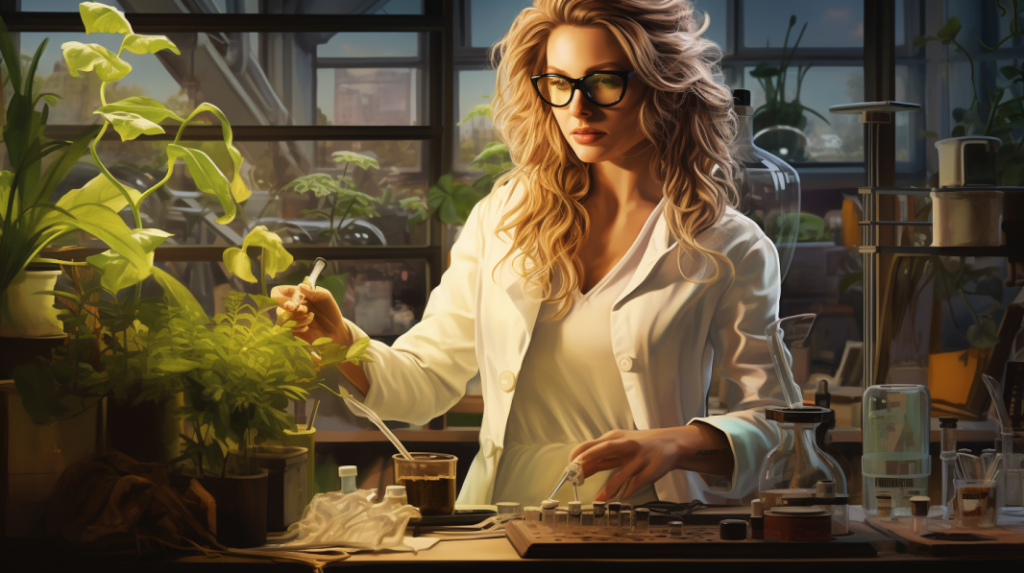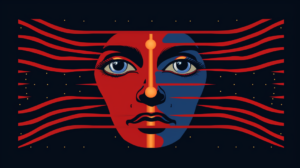Dr. Elara Morn is a paradigm of the modern scientist whose mind is not content to dwell in the shiny, sterile labs of bio-tech companies. Beneath her cool, professional facade beats a heart fueled by a deep passion for true innovation and the practical application of science. She is an expert in her field, a master of genetic coding and synthetic biology, but her ambitions are constrained by the walls of her conventional work environment.
Dr. Morn began her career with a spark in her eyes and an unshakable belief that science can change the world for the better. Fresh out of university, armed with knowledge and ambition, she joined the ranks of bio-tech companies, ready to push the boundaries of what was possible. She dreamed of green roofs on every skyscraper and air that could be breathed deeply even in the densest of metropolitan areas. Her research into genetic coding and plant biotechnology was not just innovative, it was revolutionary
But over time, the glow of their ambitions began to fade. The reality of corporate politics, the long road from research to application and dwindling support for projects that were not immediately profitable dampened her enthusiasm. Her visions of a greener, more livable world were swallowed up by the gray walls of her lab. Resignation crept into her heart as she saw research results shelved and innovative ideas gathering dust in managers’ drawers.
In Entropy Estates, Dr. Morn finds the freedom that is denied her in the upper echelons of the corporate hierarchy. There, in the Eco Guardians’ neglected gardens and makeshift greenhouses, she sees the potential for a science that directly affects the earth, promoting life where before there was only decay. Her visits to the Eco Guardians are clandestine and accompanied by a subtle excitement; here she can apply her research where it is needed most, free from the shackles of budget, politics and public opinion.
She never imagined that an academic conference in the polished conference rooms of Ravenlock City would change her life. As an expert in urban sustainability, she was invited to speak about genetic modification and its impact on urban greening. In between talks, amidst the usual networking, her attention was diverted by a group gathered in a corner of the foyer. A young man, dressed in work clothes stained with soil, was giving an off-the-record talk – an impassioned account of the Eco Guardians’ efforts to transform the wasteland of Entropy Estates into thriving gardens.
The images he showed – of children playing in gardens that were once rubble, of communities gathering around newly created ponds – were a stark contrast to the theoretical models and statistics of the conference. Dr. Morn was immediately intrigued. Here were people putting their theories into practice, with dirty hands and sweaty foreheads. The Eco Guardians weren’t working for profit or publications; they were working to improve life in their immediate communities.
When the presentation was over, she approached the speaker. Their conversation was lively, filled with jargon that turned into enthusiasm. The Eco Guardians, encouraged by Dr. Morn’s interest, invited her to visit Entropy Estates to see his group’s work firsthand.
Despite her initial hesitation – the Estates had a reputation in bio-tech circles as a lost cause – Dr. Morn decided to accept the offer. On a chilly morning, armed with nothing but an address and rough directions, she made her way to a part of the city that had long been crossed off the maps of the powers that be.
The visit to Entropy Estates opened Dr. Morn’s eyes. She saw the Eco Guardians making the impossible possible with limited resources. She realized that her research could make a real difference here, in this community. From that day on, Dr. Morn became a silent supporter of the Eco Guardians, willing to share her knowledge and resources to make the vision of green estates a reality.
The encounters with the Eco Guardians have become a kind of secret pilgrimage for Dr. Morn. She brings seeds that are resistant to the toxic atmosphere of the Estates and microbes that can revitalize the soil. She exchanges ideas with the Eco Guardians, listens and learns as much as she teaches. In her hands, science becomes a tool of empowerment, and she is amazed at the creativity and ingenuity the Eco Guardians display.
In Dr. Morn’s eyes, the Eco Guardians are not only gardeners, but also scientists. Their methods may be unconventional, their equipment cobbled together from the remnants of a consumer-driven society, but their results are undeniable. They have bred plants that thrive in the ashen soil of the Estates and created habitats that are more than mere sanctuaries – they are examples of what is possible when human will meets the power of nature.
To Dr. Morn, Entropy Estates is proof that the future of biotechnology is not only to be found in the skyscrapers of the wealthy, but also in the hands of those connected to the earth. Her visits there may be a professional risk, but for Elara they are a necessary part of her own personal search for truth and the application of her life’s work. In the quiet hours she spends with the Eco Guardians, she finds hope – a rare commodity in her world that she values all the more.



